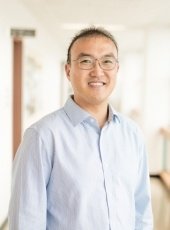
A Chemistry Seminar will be presented Friday, September 13, 2020, at 3:00 p.m., via online meeting.
Dr. Sangyoon Han will present his lecture, “Toward Discovery of the Initial Stiffness-Sensing Mechanism by Adherent Cells.” Han is an Assistant Professor in Biomedical Engineering, an Affiliate Assistant Professor in Mechanical Engineering-Engineering Mechanics, and advisor for the Korean Student Association. Han is a member of the ICC’s Center for Data Science.
Lecture Abstract
The stiffness of the extracellular matrix (ECM) determines nearly every aspect of cellular/tissue development and contributes to metastasis of cancer. Adherent cells’ stiffness-sensing of the ECM triggers intracellular signaling that can affect proliferation, differentiation, and migration of the cells. However, biomechanical and molecular mechanisms behind this stiffness sensing have been largely unclear. One critical early event during the stiff-sensing is believed to be a force transmission through integrin-based adhesions, changing the molecular conformation of the molecules comprising the adhesions that link the ECM to the cytoskeleton. To understand this force transmission, my lab develops experimental and computational techniques, which include soft-gel-based substrates, live-cell imaging, computer-vision-based analysis, and inverse mechanics, etc. In this talk, I will talk about how we use soft-gel to quantify the spatial distribution of mechanical force transmitted by a cell, how we use light microscopy and computer vision to analyze the focal adhesions, and how these techniques are related to stiffness sensing. In particular, I will show you new data where cells can transmit different levels of traction forces in response to varying stiffness, even when the activity of the major motor protein, myosin, is inhibited. At the end of the talk, potential molecules responsible for the differential transmission will be discussed.
Researcher Bio
Sangyoon Han received his Ph.D. in Mechanical Engineering at the University of Washington (UW) in 2012 and did postdoctoral training with Dr. Gaudenz Danuser in the Department of Cell Biology at Harvard Medical School and the University of Texas Southwestern Medical Center for five years until 2017. Before the Ph.D., he received B.S and M.S. degree from Mechanical Engineering at Seoul National University, Seoul, Korea in 2002 and 2004.
He joined Michigan Tech, Biomedical Engineering from fall 2017, and started Mechanobiology Laboratory. His lab’s interests are in understanding the dynamic nature of force modulation occurring across cell adhesions and cytoskeleton that regulate cells’ environmental sensing. His lab develops a minimally-perturbing experimental approach and computational techniques, including soft-gel fabrication, nano-mechanical tools, live-cell microscopy, and image data modeling, to capture the coupling between force modulation and cellular molecular dynamics.